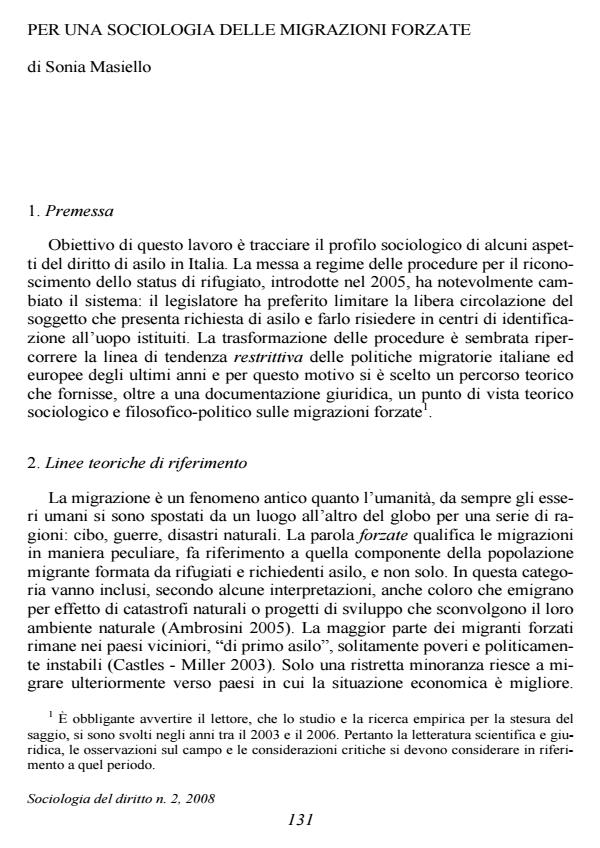Per una sociologia delle migrazioni forzate
Titolo Rivista SOCIOLOGIA DEL DIRITTO
Autori/Curatori Sonia Masiello
Anno di pubblicazione 2008 Fascicolo 2008/2 Lingua Italiano
Numero pagine 24 P. 131-154 Dimensione file 364 KB
DOI
Il DOI è il codice a barre della proprietà intellettuale: per saperne di più
clicca qui
Qui sotto puoi vedere in anteprima la prima pagina di questo articolo.
Se questo articolo ti interessa, lo puoi acquistare (e scaricare in formato pdf) seguendo le facili indicazioni per acquistare il download credit. Acquista Download Credits per scaricare questo Articolo in formato PDF

FrancoAngeli è membro della Publishers International Linking Association, Inc (PILA)associazione indipendente e non profit per facilitare (attraverso i servizi tecnologici implementati da CrossRef.org) l’accesso degli studiosi ai contenuti digitali nelle pubblicazioni professionali e scientifiche
Towards a Sociology of Enforced Migrations - As a consequence of the implementation of Italian Law N° 189/2002, known as the Bossi-Fini Act, and of its administrative regulations issued in April 2005, many aspects of the previous system governing immigration were changed. The first of these is the committee now responsible for determining the status of a refugee. In the past, there was only one such committee in Rome, while there are now seven of them. Another important factor of change is the preventive detention of asylum seekers in special centres for the identification of migrants. The principal aim of the article is to observe and describe the transformations taking place, as seen through the eyes of several different opinion leaders and policy makers (exponents of public administration, International Organizations, NGOs, Christian associations), as well as through interviews with asylum seekers and discussion of their living conditions in the camps. Sociological observations were conducted in three camps: two in Puglia (Foggia and Bari) and one in Calabria (Crotone). The results of the investigations are interpreted in theoretical structures that inform global change. As S. Castles has pointed out, the study of forced migration is linked to research of economic migration, but needs to be analysed by its own specific research topics, methodological problems and conceptual issues. So the main aim is to interpret change in Italy as a piece in a global mosaic.;
Sonia Masiello, Per una sociologia delle migrazioni forzate in "SOCIOLOGIA DEL DIRITTO " 2/2008, pp 131-154, DOI: